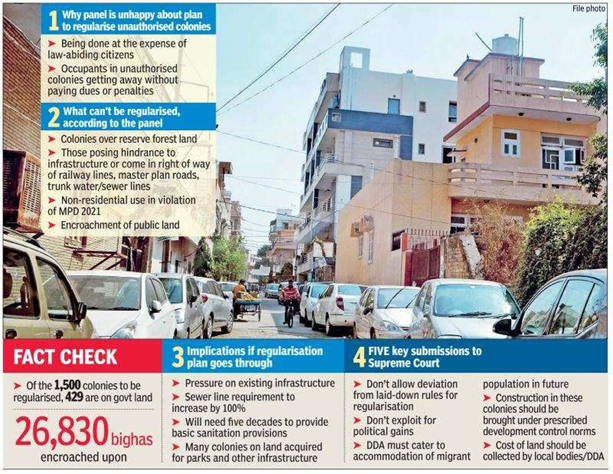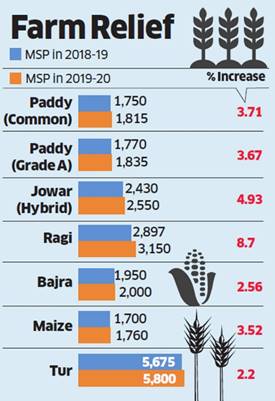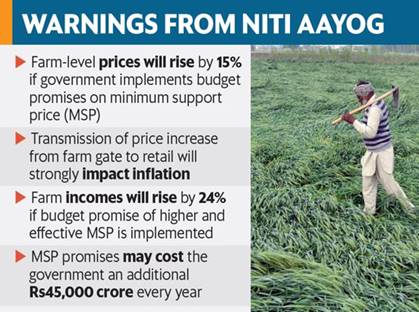



An old Delhi demand met: Govt will regularise illegal colonies
In a move that will impact over 40 lakh people i.e. a fifth of Delhi’s population. Centre clearedproposal to regularise 1,728 unauthorised colonies in national capital, fulfilling a promise made by political parties for almost two decades.
- The decision in effect means that residents will get ownership and transfer rights to the land, as well as access to infrastructure and civic amenities.
- The rights will be conferred on payment of a nominal charge based on carpet area and plot size ranging from 0.5% to 2.5% of the circle rate.
- The government will introduce a bill in the winter session of Parliament to initiate proceedings.
- The bill will provide for registration charge and stamp duty on the last transaction, as well as address the issue of income-tax liability.

- These colonies are mostly inhabited by poormigrants—without the authorization of civic authorities. Hence, this move will benefit these person.
- There are unsafe structures and because they are unauthorized, the central government was unable to provide anyservice.
- This move will help these people to get permission for construction or for loans.
- Regularisation drives will help government to achieve housing for all by 2022, as it will recognise rights of the economically backward section.
- While basic water and power connections, sanitation and sewerage services can be provided in such areas, but retrofitting other infrastructure is difficult due to lack of space. The houses are so tightly packed that one couldn’t provide any public space without bringing down some buildings.
- Delhi’s unauthorised colonies have only grown in numbers and size. Fifty-six years ago, Delhi had 110 unauthorised colonies, housing nearly 221,000 people. Today, it has 1,797 of them.
- Delhi’s regularised colonies stand on weak foundations. Walls are constructed paper thin to stretch the carpet area. Load-bearing beams and pillars are done away with to create additional space.
- The Supreme Court monitoring committee has argued that regularisation at the cost of bona-fide residents of Delhi creates a “moral stigma” with respect to the rights of honest citizens.
- Honest tax payers are paying huge amounts for getting premises regularised, but occupants in unauthorised colonies are neither paying dues laid down nor penalties for commercial activities.
- Supreme Court monitoring committee warned that periodic regularisation of this sort would have a serious effect on existing infrastructure.

Assam government announced that people with more than two children will not be eligible for government jobs from January 2021.
- Assam will become the fourth state after Maharashtra, Madhya Pradesh and Rajasthan to have a two-child norm in place for government jobs.
- At least five other states follow this norm for candidates seeking elections to local bodies such as panchayats, municipal corporations and zila parishads.
- Such as debarring people from holding government office amount to penalising weaker sections of the population, including women, whose reproductive choices are often subject to a variety of constraints.
- Almost all surveys indicate that India’s population growth rate has slowed substantially in the last decade. According to the latest National Family Health Survey (NFHS-4), at 2.2, India’s total fertility rate (TFR) is very close to the desired replacement level of 2.1.
- In spite of the fall in TFR, India’s population has continued to grow because nearly 50 per cent of the people are in the age group of 15-49. This means that the absolute population will continue to rise even though couples have less children.
- Right to seek a government job or contest elections are citizens’ rights. State cant curb it on the name of population control.
- Educating society to raise marriage age.
- Delayingfirst pregnancy and ensuring spacing between births.
- Dealing with country’s demographic peculiarity will require investments in health, education, nutrition and employment avenues.
Centre onrefrained from announcing a big hike in the minimum support price (MSP) of cereal, as it kept the MSP of wheat at Rs 1,925 per quintal — an increase of Rs 85 per quintal, the lowest in last four years. However, a higher increase in MSP was recommended for lentil, as well as safflower and gram.
Further, the Cabinet Committee on Economic Affairs (CCEA), chaired by Prime Minister Narendra Modi, also gave nod to a hike in the MSPs of barley and rapeseed and mustard for Rabi Market Season (RMS) 2020-21.
- Minimum Support Price (MSP) is a form of market intervention by the Government of India to insure agricultural producers against any sharp fall in farm prices.
- The minimum support prices are announced by the Government of India at the beginning of the sowing season for certain crops on recommendations of Commission for Agricultural Costs and Prices (CACP).
- MSP is price fixed by Government of India to protect the producer - farmers - against excessive fall in price during bumper production years.
- Cabinet Committee of Economic Affairs announces MSP for various crops at the beginning of each sowing season based on the recommendations of the Commission for Agricultural Costs and Prices (CACP).

- In formulating the recommendations of minimum support prices Commission takes into account, apart from a comprehensive view of the entire structure of the economy of a particular commodity or group of commodities, the following factors:-
- Cost of production
- Changes in input prices
- Input-output price parity
- Trends in market prices
- Demand and supply
- Inter-crop price parity
- Effect on industrial cost structure
- Effect on cost of living
- Effect on general price level
- International price situation
- Parity between prices paid and prices received by the farmers.
- Effect on issue prices and implications for subsidy
- Government has announced its historic decision to fix MSP at a level of at least 150 per cent of the cost of production for kharif crops 2018-19.
- Government announces minimum support prices (MSPs) for 22 mandated crops and fair and remunerative price (FRP) for sugarcane.
- The mandated crops are 14 crops of the kharif season, 6 rabi crops and two other commercial crops.
- In addition, the MSPs of toria and de-husked coconut are fixed on the basis of the MSPs of rapeseed/mustard and copra, respectively.
- Procurement of wheat and paddy for meeting the requirement of the public distribution system (PDS) is undertaken largely by state governments. Of the total procurement of wheat and paddy from farmers, the Food Corporation of India’s (FCI’s) share is less than 10%.
- The second scheme is the price support scheme (PSS) under which Central agencies like NAFED can procure notified commodities for which MSPs are declared, including oilseed, pulses and copra.
- The third scheme is through the price stabilization fund (PSF), operated by the department of consumer affairs (Doca) under which interest-free working capital is provided to the procuring agency. Under this scheme, NAFED, FCI and the Small Farmers’ Agribusiness Consortium have procured about 20 lakh tonnes of pulses for buffer stock.
- The fourth scheme is for procurement of cotton at MSP, which is largely operated by the Cotton Corporation of India (CCI), whose losses are fully reimbursed by the Union ministry of textiles.
- Market intervention scheme (MIS) under which specific proposals of state governments are considered by department of agriculture on a case-to-case basis and Centre bears up to 50% loss incurred in operations. But the proposals can be approved only if there is 10% increase in production or 10% fall in rates over a normal year in a state.
- It prevents distress sale.
- Government announces MSP before the sowing season for 23 crops including cereals, pulses, oilseeds & certain cash crops. This advance information helps farmers to make an informed decision about which crop to sow for maximum economic benefit within the limitations of his farm size, climate and irrigation facilities.
- MSP sends a price-signal to market that if merchants don’t offer higher than MSP prices farmer may not sell them his produce. Thus it acts as an anchor or benchmark for agro-commodity market.
- MSP is also used to incentivize farming of required crops like Oil, Pulses. It is critical in ensuring nutritional as well food security.
- Minimum Support Price (MSP) also helps government control the growth of crops which are low in production.
- The government can use these crops to be sold at government fair price shops at a price lower than market rate. This will also help the government in making these crops available to the below poverty line people at a lower price.
- Lack of awareness among farmers about MSP, poor information dissemination can be a reason.
- A majority of growers in the country do not receive the specified MSP (barring, of course, for wheat and rice that too in some States).
- In the case of rice and wheat, grain mono-cropping and open-ended procurement at support price in agriculturally important States of Punjab, Haryana and Uttar Pradesh are leading to disastrous environmental impacts. Soil health has deteriorated and the water table has gone down to alarmingly low levels.
- In crops where we face a shortage, growers should obviously benefit from high prices. Yet, oilseed prices have been ruling either below or close to MSP.
- In north-east and many other states, procurement operations are almost non-existent and farmers are forced to sell below MSP


Google CEO Sundar Pichai has issued an official blog post regarding the news of Google’s team of researchers achieving their big breakthrough in quantum computing, known as ‘quantum supremacy'.
- Google’s quantum computer took just over three minutes or around 200 seconds to complete a highly technical and specialised computation, which would have taken a regular computer 10,000 years to work out.
- Long way to go between today’s lab experiments and tomorrow’s practical applications.
- It will be many years before we can implement a broader set of real-world applications.
- Quantum computing will be able to help give more concrete answers to some of the world’s biggest problems from climate change to disease.
- Quantum computing can be applied todesign more efficient batteries, create fertilizer using less energy, and figure out what molecules might make effective medicines.
- Unlike ordinary computers which score information and data as bits of either zero or one, a quantum computer relies on qubits, which can be 1 and 0 at the same time.
- Each qubit represents two states at once, and therefore the total number of states doubles with each added qubit.
- If you have two quantum bits, there are four possible states that you can put in superposition, and those grow exponentially.
- With 333 qubits there are 2^333, or 1.7×10^100—a Google—computational states you can put in superposition allowing a quantum computer to simultaneously explore a rich space of many possible solutions to a problem.
- IBM argue that an ideal simulation of the same task can be performed on a classical system in 2.5 days and with far greater fidelity.
- IBM’s claim is that it would not have taken a classical system to achieve the same in thousands of years as Google has implied.
- The blog also said that the term “quantum supremacy” is being broadly misinterpreted.
In 1908, Gandhiji showed us the path for sustainable development through sustainable consumption. In his Hind Swaraj, he outlined threat to the common future of humanity from our relentless quest for material goods and services.
- He believed that native, indigenous knowledge and culture needs to be respected.
- This worldview shuns the idea of more consumption, which is both a cause and consequence of greed.
- Gandhiji agreed that with technological advancement and changing aspirations of people, tools may have to be different. However, he cautioned against unnecessary consumption.
- He believed that harmonious growth can be achieved by employing cultural practices.
- He had an unshakeable faith in the native’s wisdom and intelligence. He strongly believed that it could be achieved only by employing local resources and local talent.
- He criticized Jawaharlal Nehru for wasting precious natural resources for his comfort.
- He spoke about harnessing natural resources as a virtue.
- According to him, natural resources should be used respectfully, and carefully to ensure equitable distribution and also to ensure that we leave a better world for future generations.
- He had underlined the need for a decentralised system of economics and development so that local, distinctive characteristics can be factored in while formulating plans on the basis of statistical information.
- Talking of sustainable development without understanding the true meaning of sustainable consumption will be mere rhetoric.
- Citing various classical scriptures and cultural practices, he eulogised frugal (maryadit) spending by Indians, in accordance with their dharma.

© 2025 iasgyan. All right reserved